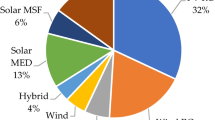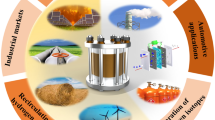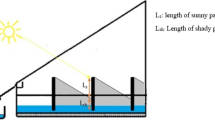This article examines the areas of use of water with near-zero temperature. It proposes a vacuum water-cooling technology where water acts simultaneously as a coolant and a cold carrier. In order to reduce the temperature differential in the water layers during vacuuming, a composite is created from alternating layers of ice and water, where the upper water layers remain free from ice. Such a method helps reduce energy consumption for implementation of the process. The cited experimental data on the temperature field across the evaporation vessel depth suggest uniformity of the field with a near-zero temperature index. Besides the possibility of getting near-zero temperature in the alternating water and ice layers, there occurs a significant rise in the cooling capacity of such a composite, which produces a salutary effect on the economic factors of the unit.


Similar content being viewed by others
Reference
B. T. Marinyuk, TNT Heat Exchangers: Calculations and Designs [in Russian], Energoatomizdat, Moscow (2009), p. 196.
Author information
Authors and Affiliations
Additional information
Translated from Khimicheskoe i Neftegazovoe Mahinostroenie, No. 8, p. 17, August, 2010.
Rights and permissions
About this article
Cite this article
Marinyuk, B.T., Hegazy, A.A. Producing water with near-zero temperature in vacuum process. Chem Petrol Eng 46, 456–457 (2010). https://doi.org/10.1007/s10556-010-9359-9
Published:
Issue Date:
DOI: https://doi.org/10.1007/s10556-010-9359-9




